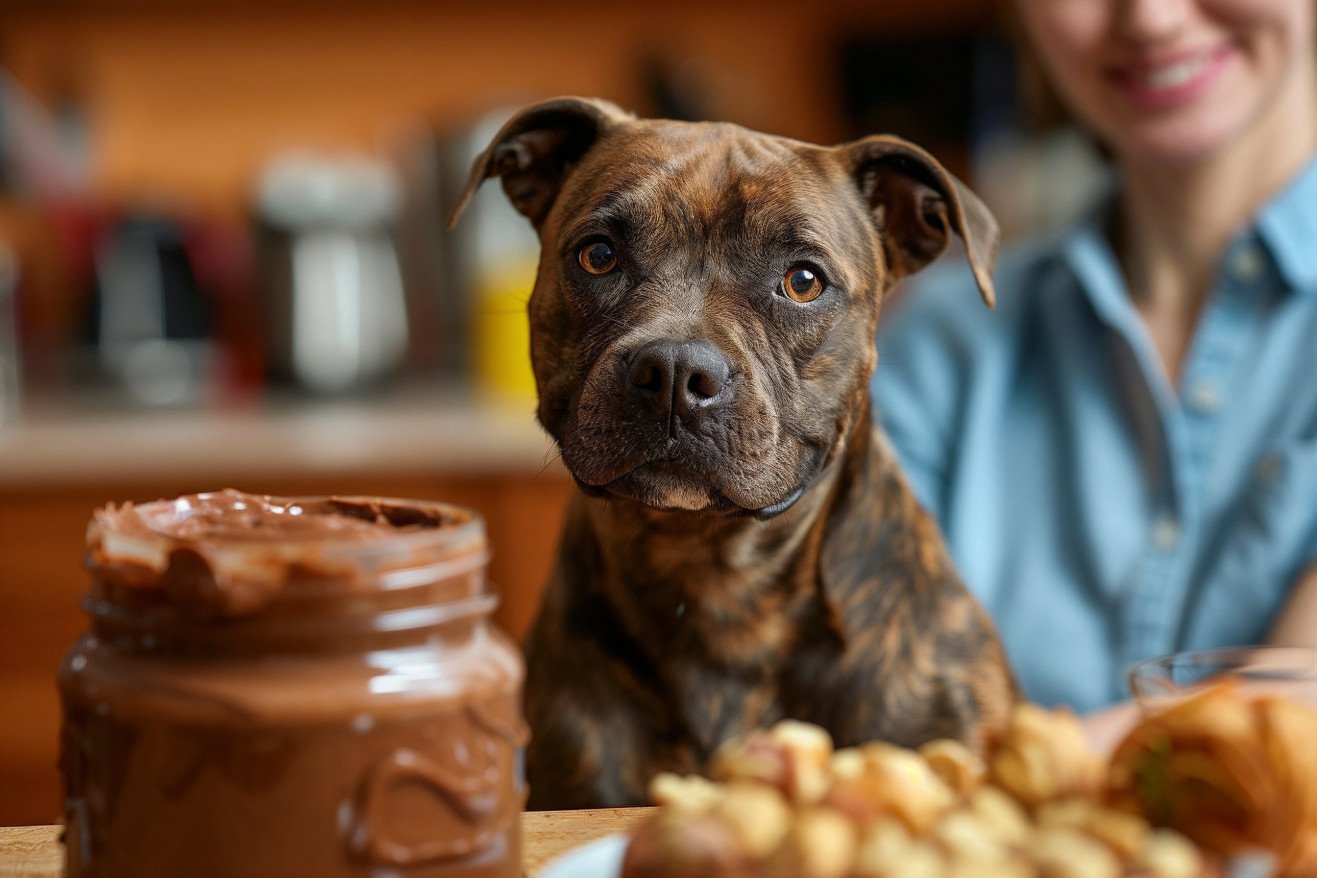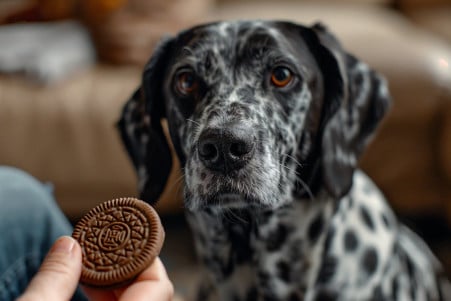Can Dogs Have Nutella? Know the Risks to Your Dog
10 February 2024 • Updated 8 February 2024

Nutella is a delicious chocolatey spread, but is it safe for your furry friend to eat? No, dogs cannot have Nutella. The theobromine in Nutella is poisonous to dogs, and the high sugar and fat content in Nutella can lead to pancreatitis in dogs. If your dog has eaten Nutella, it’s important to get them to a vet right away.
This article will take a deep dive into veterinary studies, toxicology research, and nutritional data to explain why Nutella is toxic to dogs. We’ll also look at how the ingredients in human food can be toxic to pets by examining the differences in how dogs and humans metabolize certain substances. This will help you better understand what dogs can and can’t eat and help you make the best choices for your pet.
Can dogs have Nutella?
Theobromine Toxicity in Dogs
One of the biggest dangers of Nutella for dogs is the presence of theobromine, a bitter alkaloid in chocolate. Theobromine is safe for humans but can be toxic for dogs due to their slower metabolism of the caffeine-like substance. This causes theobromine to build up in a dog’s system.
The Merck Veterinary Manual explains that signs of theobromine poisoning in dogs, including vomiting, diarrhea, restlessness, and in severe cases, seizures and heart failure, can take several hours to appear after ingestion and last for days.
Wag! reports that theobromine toxicity can occur in dogs at about 20 mg per kilogram of body weight, with doses of 200 mg per kilogram and higher potentially leading to death. This makes it important to ensure that dogs receive timely and effective treatment.
If the dog has recently eaten the Nutella, Veterinary Partner recommends inducing vomiting and administering activated charcoal to absorb the theobromine in the dog’s stomach and intestines. Veterinarians may also need to provide supportive treatment, including IV fluids and medications to control heart rate and seizures.
Knowing these symptoms and acting fast can help ensure a dog’s survival. If a dog has eaten Nutella, it’s important to get them to a veterinarian as soon as possible, as quick treatment is essential for a good outcome. While we’ve focused on the dangers of theobromine, it’s also important to note that there are other ingredients in Nutella that can be harmful to dogs.
Other Ingredients in Nutella That Are Bad for Dogs
In addition to theobromine, Nutella contains other ingredients that are bad for dogs. While sugar isn’t toxic, it can lead to obesity and dental problems in dogs if they eat too much of it. Palm oil, another ingredient in Nutella, is high in fat and can cause stomach upset and, in more extreme cases, pancreatitis, according to Pet Keen.
While hazelnuts aren’t toxic to dogs, their high fat content can cause digestive issues and obesity. In addition, eating too many hazelnuts can cause dogs to choke or suffer from an intestinal blockage.
In addition, the skim milk in Nutella can be bad for dogs that are lactose intolerant, as it can cause gastrointestinal upset. According to Dr. Iulia Mihai, while milk powder isn’t toxic, dogs that are lactose intolerant can have a bad reaction to it.
When planning your dog’s diet, it’s important to focus on foods that are formulated to meet their specific nutritional needs. When it comes to treats, make sure you stick to dog-friendly options and give them in moderation to avoid these issues. Having a broader understanding of the basics of dog food toxicity is important for responsible pet parents and making sure we’re looking out for our pets’ best interests.
How to Tell If Your Dog Has Eaten Something Toxic
Dogs are known for exploring the world with their mouths, which can sometimes lead to the accidental ingestion of toxic substances. The Humane Society lists several common human foods that are toxic to dogs, including alcohol, grapes, raisins, macadamia nuts, and anything with caffeine. All of these can cause anything from mild gastrointestinal upset to severe toxicity.
WebMD explains that symptoms of food poisoning in dogs can include vomiting, diarrhea, panting, excessive thirst and urination, hyperactivity, and in severe cases, seizures, and even death. If you think your dog has eaten a toxic food, it’s important to get them to the vet right away. The ASPCA Animal Poison Control Center urges pet parents to act quickly to determine if their dog is experiencing a mild reaction or a more serious one.
Knowing the risks that certain human foods pose to dogs also highlights the importance of pet parents being proactive in keeping these foods out of their dogs’ reach. A well-informed and ready pet parent can help ensure that their dog’s health isn’t compromised if they accidentally eat something they shouldn’t. Given how sensitive dogs’ digestive systems can be, it’s clear that human foods like Nutella aren’t appropriate for dogs.
The Science Behind Canine Dietary Needs
To understand why dogs can’t eat Nutella while humans can, it’s important to look at some of the metabolic differences between humans and dogs. A paper from PMC by Alison Beloshapka shows that small and large dog breeds have differences in their metabolism, including how they metabolize antioxidants and amino acids. This indicates that dietary requirements can differ not just between species but also within a species based on factors like size.
In addition, human foods like Nutella don’t have to meet the strict safety standards that pet foods do. The CDC explains that pet food manufacturers are required to cook or heat their products to high temperatures to kill bacteria and ensure that the food is nutritionally adequate for pets.
On the other hand, human food manufacturers aren’t held to the same standards when it comes to canine health, which is why a product like Nutella, which is safe for humans, isn’t safe for dogs.
Dogs’ metabolic pathways and digestive systems are different from humans’, as explained in Marilyn N Martinez’s research on drug pharmacokinetics. These differences impact how dogs absorb and excrete different substances, which makes human foods that contain substances that are toxic to dogs, like theobromine, especially dangerous.
When you consider these factors, it’s clear that it’s important to stick to foods and treats that are specifically formulated for dogs to keep them safe. By choosing products that have been tested for safety and nutritional content, you can make sure that your dog gets the balanced diet they need to stay healthy.
The Effects of High Sugar and Fat Diets on Dogs
Knowing the effects of high sugar and fat diets on dogs is important. According to research published in PMC, dogs that eat high-fat diets can experience significant metabolic and inflammatory changes.
High-fat diets are a major cause of obesity, which impacts 34 to 60% of dogs and can lead to insulin resistance and cardiovascular disease. In addition to contributing to obesity, the high-fat content in dog diets can also lead to a reduction in their overall health and lifespan, mirroring the effects of high-fat diets in humans.
The effects of high sugar diets are just as worrisome. While sugar isn’t toxic to dogs, high sugar diets can lead to obesity and dental issues. The FDA regulates pet food safety and labeling through the Association of American Feed Control Officials to make sure that pet food is safe and nutritionally sound for pets. This is in stark contrast to the lack of regulations surrounding dogs eating human food.
Part of being a responsible pet owner is following the dietary recommendations that are specific to dogs to avoid health problems like pancreatitis and obesity. This is especially important when it comes to avoiding products like Nutella, which are high in sugar and fat and therefore not safe for a healthy dog diet, and shows why it’s important to stick to pet-specific food products.
Final Thoughts: Can Dogs Eat Nutella?
In summary, while Nutella may be a delicious snack for people, it can be dangerous for dogs. Hepper explains that the theobromine in cocoa is a potential, if unlikely, risk for dogs.
Rested Paws goes into more detail about the more immediate dangers of Nutella, including the high sugar and fat content, which can lead to obesity, pancreatitis, and other health problems in dogs, as well as the potential for digestive issues from palm oil and blockages from hazelnuts.
The conclusion from experts like Michael Ross and veterinary sources is the same: Nutella is not a good choice for dogs because it is not nutritious and can be harmful.
It is important for dog owners to make sure they are looking out for their pets’ best interests by understanding their nutritional needs and avoiding dangerous human foods. By sticking to a healthy, species-appropriate diet and making sure to follow safe eating practices, you can help make sure that your furry friend stays healthy and happy.


